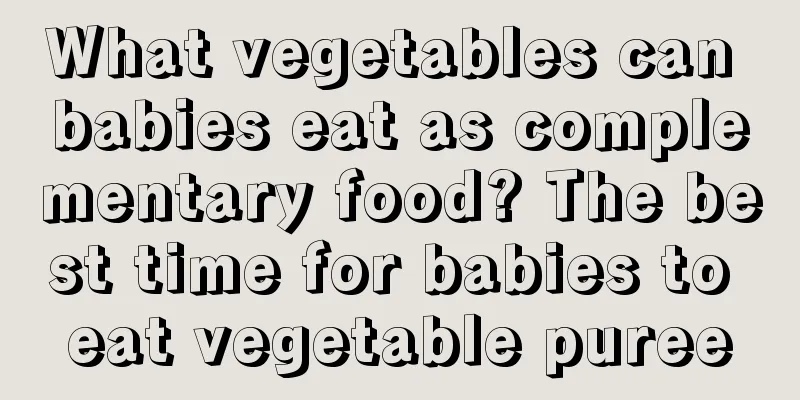What vegetables can babies eat as complementary food? The best time for babies to eat vegetable puree

|
Vegetables can provide a lot of trace elements for human nutrition. Eating vegetables regularly can ensure good health. So when can babies start eating vegetables? Which vegetables are better to make into vegetable puree to add to baby's complementary food? Let's take a look~ What vegetable purees can babies eat?1. Carrots Carrots are one of the most nutritious vegetables. Carrots contain the most carotene among all vegetables. A large part of the vitamin A people need is converted from carotene. Vitamin A mainly helps improve the body's immune system function, avoids respiratory and urinary tract infections, and greatly promotes the growth and development of babies. 2. Lettuce The characteristic of lettuce is that it contains a lot of water, and is rich in dietary fiber, B vitamins, vitamin C, vitamin E, etc., which can help the baby enhance immunity and resistance to disease. The minerals calcium, iron and copper in lettuce can also help promote the baby's bone and tooth development, and prevent rickets in children. 3. Tomatoes Tomatoes are rich in lycopene, and are known as the natural storehouse of lycopene. Tomatoes are also rich in vitamin C and vitamin E, which can improve the baby's immunity and prevent melanin deposition, keeping the baby's skin pink and tender. 4. Pumpkin Pumpkin is rich in nutrients, containing carbohydrates, vitamins, rich proteins, and 17 kinds of amino acids needed by babies. The zinc in pumpkin can also help the synthesis of human nucleic acid and protein, helping babies grow and develop better. Babies should not eat 4 kinds of vegetablesAmaranth Amaranth contains relatively high nitrates, and babies have more bacteria in their mouths, such as Pseudomonas aeruginosa, Proteus, Bacillus, etc. These bacteria are more common in the mouths of babies under 1 year old, and they can easily convert nitrates into nitrites, so babies are at risk of nitrite poisoning and thus get cyanosis. These bacteria are harmless to babies and help them digest food, because the acidity of their gastric juice is too low and they cannot digest many foods. Why is it that adults are less likely to have this phenomenon? Because adults do not have these bacteria in their mouths and their gastric juice is more acidic. Beetroot, spinach, broccoli In addition to amaranth, vegetables with high potassium nitrate content such as carrots, beets, spinach, broccoli, etc. should also be fed to very young babies as little as possible. Foods that babies cannot eatMeat Egg white The protein molecules in egg white are small and can sometimes pass through the intestinal wall directly into the baby's blood, causing the baby's body to have an allergic reaction to foreign protein molecules, leading to diseases such as eczema and urticaria. Egg white should not be given to the baby until he is one year old. Seafood Shellfish such as crabs and shrimps can cause allergic symptoms in infants and are not recommended for feeding before the age of 1. Vegetables Vegetables high in oxalic acid Vegetables such as spinach, leek, and amaranth contain a large amount of oxalic acid, which is not easily absorbed in the human body. It will affect the absorption of calcium in food and can cause poor development of bones and teeth in children. Indigestible vegetables The digestive function of infants is not fully developed, so it is best to wait until the baby is older before feeding him vegetables that are difficult to digest, such as bamboo shoots and burdock. In addition, vegetable stems that contain too much fiber should not be fed to babies. Beans Beans contain factors that can cause goiter, and babies are more vulnerable to damage during their growth and development period. In addition, beans are difficult to cook thoroughly and are prone to allergic and toxic reactions. The best time for babies to eat vegetable pureeVegetable juice can be made by boiling fresh vegetables with water, which contains a large amount of vitamin C and other water-soluble vitamins dissolved in it. Vitamin C has the function of maintaining normal physiological functions of the human body, promoting health, and enhancing the body's resistance. Lack of vitamin C in the body can cause scurvy. For infants who are breastfed within 4 months, as the vitamin C content in the mother's diet directly affects the vitamin C content in breast milk, as long as the mother eats more vegetables and fruits rich in vitamin C, the baby does not need to be fed with vegetable juice; while for babies who are bottle-fed, as the vitamin C content in milk is extremely low, they should be fed with vegetable juice frequently to supplement vitamin C. Vegetables also contain many inorganic salts that are closely related to the health of infants, such as calcium, phosphorus, iron, etc. Since these nutrients are insoluble in water and cannot be taken in from vegetable juice, it is necessary to make vegetables into puree or minced vegetables to feed infants. After 4 months, breast milk can no longer meet the needs of growth and development for breastfed babies, and complementary foods must be added. Therefore, no matter which way the baby is fed, he should often eat some vegetable puree when he is 4-6 months old. |
>>: Can pregnant women eat black rice? Can pregnant women eat black rice?
Recommend
How about Kao toothpaste? Does Kao toothpaste contain fluoride?
Kao has many products under its umbrella, and the...
What should I do if my skin becomes dull after miscarriage? How can I recover after miscarriage?
Many women choose to have an abortion after an un...
Can newborn baby's eyelashes be trimmed? Can newborn baby's eyelashes grow longer if trimmed?
Can newborn baby's eyelashes grow longer if t...
What is the cause of milk blockage? There may be several reasons
New mothers are prone to milk duct blockage in th...
Does it hurt to have a hydrotubation? Does it hurt to have a hydrotubation?
Tubal infertility is a common infertility problem...
Will Dettol disinfectant discolor clothes? How to use Dettol disinfectant to wash clothes?
The application range of Dettol disinfectant is v...
Will the baby choke on water during a water birth? What conditions need to be met for a water birth?
I think everyone has heard of water birth. Water ...
How long should you drink brown sugar water after giving birth? How much brown sugar water should a pregnant woman drink a day?
Drinking brown sugar water after childbirth is a ...
What is the dirt on the newborn's head? How to wash it off?
The baby is only one week old, and there is a thi...
Where is the baby's fontanelle? Where is the fontanelle?
The fontanelle is an organ on the baby's head...
What kind of people are not suitable for natural childbirth? What factors affect it?
Most mothers want to have a natural birth. Babies...
Can a woman still have a baby after her uterus ruptures?
Women need to face many risks when they are pregn...
How to prevent heavy bleeding during childbirth
There will be various unexpected emergencies duri...
Does painless childbirth have any effect on the fetus? Does painless childbirth have any side effects?
In order to reduce the pain during childbirth, ma...
How long should a newborn baby with jaundice be exposed to the sun? Should a newborn baby with jaundice drink more water?
It is a common phenomenon for newborns to suffer ...









